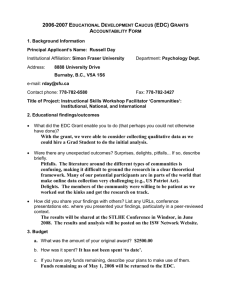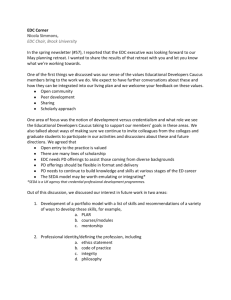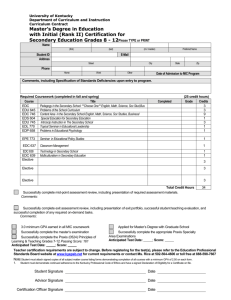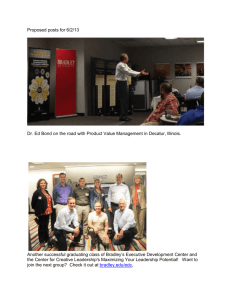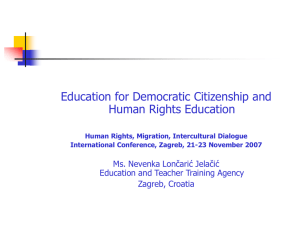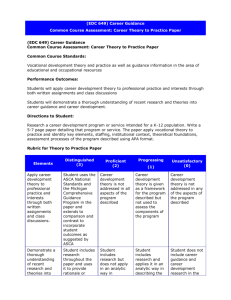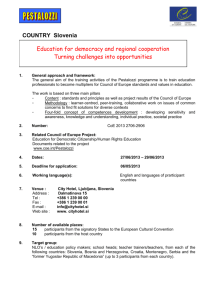A GLOSSARY OF TERMS FOR EDUCATION FOR DEMOCRATIC CITIZENSHIP
advertisement
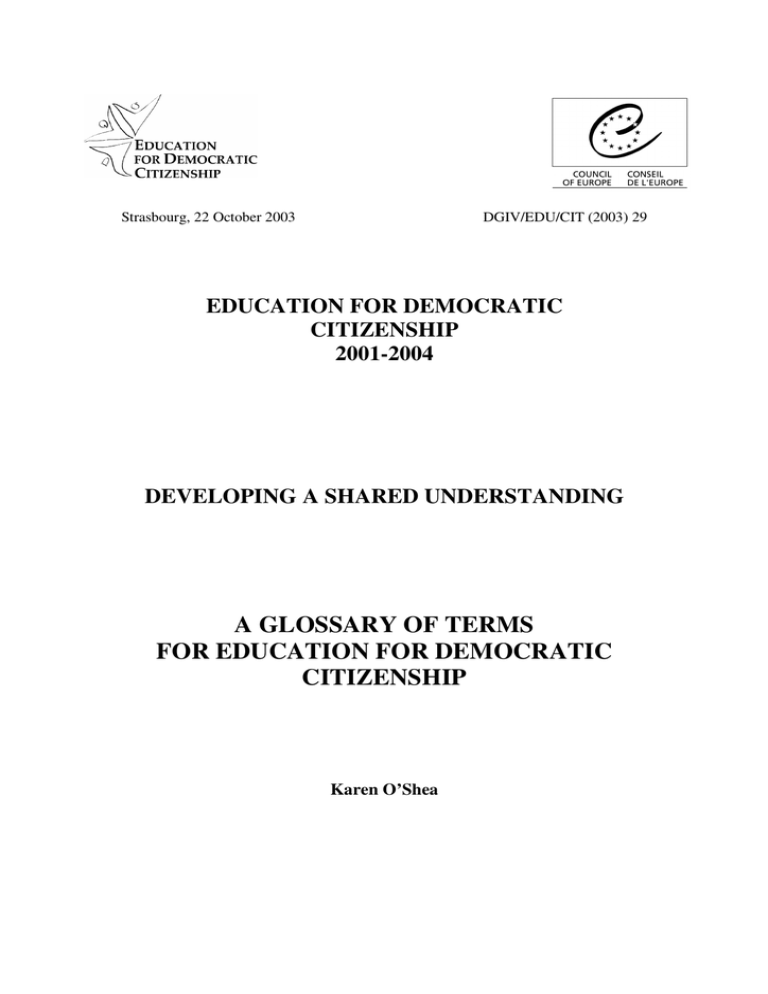
Strasbourg, 22 October 2003 DGIV/EDU/CIT (2003) 29 EDUCATION FOR DEMOCRATIC CITIZENSHIP 2001-2004 DEVELOPING A SHARED UNDERSTANDING A GLOSSARY OF TERMS FOR EDUCATION FOR DEMOCRATIC CITIZENSHIP Karen O’Shea Acknowledgements The author wishes to acknowledge all those who contributed to the Council of Europe documents that were the source for developing this glossary. They include report writers, researchers, participants at seminars and conferences and Council of Europe staff. Without their deliberations and considered thinking developing this glossary would not have been possible. The author hopes that the terms given in this glossary adequately express the ideas contained in many of the report and studies produced and as such reflect the wide range of thinking available within the Council of Europe. The documents that supported the writing of this glossary are listed in the bibliography. 2 CONTENTS Executive Summary Introduction 6 Section I: Core Concepts 8 Citizen/Citizenship Citizenship Sites Civil and Political Rights Cultural Rights Democracy/Democratic Diversity Economic and Social Rights Education for Democratic Citizenship Equality Human Rights Section II: Processes and Practices 13 Action Active Learning Co-operative Learning Critical Analysis Curriculum Development Evaluation Learner Centred Life-long Learning Reflection Research Teacher/Educator Training Section III: Outcomes 18 3 Affective Outcomes Cognitive Outcomes Participation Positive Peace Pragmatic or Action Outcomes Bibliography Responsibility Social Cohesion Solidarity Sustainable Development 22 Executive Summary Education for Democratic Citizenship (within this glossary the term EDC will be used) is a subject that has achieved significant prominence and interest within the Council of Europe and individual member states. The resulting increase has led to the widening of the debate and the inclusion on new partners in the field. A significant number of these new partners play an important role in promoting EDC at a policy level. Some of these new partners are not as familiar with the nuances of meaning that underpin many of the terms commonly used within discussion and debates on EDC. This glossary therefore is offered as a tool to support the promotion of EDC policy in member States. It is beyond the scope of this glossary to include the full range of terms associated with EDC. The terms chosen reflect current thinking within a number of Council of Europe documents. They are not offered as strict definitions but rather as short explorations of the term and its relationship to EDC. The glossary includes thirty-one terms and is divided into three sections, namely, Core concepts Processes and practices of EDC Outcomes of EDC. Thus the glossary seeks to offer the reader an introductory framework and pathway through the significant terms associated with EDC. 5 1. Introduction Background The first EDC project (1997-2000) sought to explore the concepts and practice of education for democratic citizenship through research, conferences and supporting sites of citizenship. As a result of the success of this project a second project was launched in 2001 and will continue until 2004. Within this second project, policy development has been identified as the first priority and there are currently a number of activities underway. In 2001 the first international seminar on EDC policies and regulatory frameworks and important progress has been with the appointment of national EDC coordinators within each of the member states. There are also two significant studies underway; ‘AllEuropean Study on Policies for EDC’, as well as the development of ‘The Common Framework on EDC Policies’. As stated above, the first EDC project was the context for the exploration of the concepts and practices central to EDC. A number of important documents were produced during this time, many of which are listed in the bibliography. However, as the work has turned towards policy-making, the need for a short glossary of terms has emerged. Aim The overall aim of this glossary is to support policy makers and practitioners in the promotion of EDC within member states. It seeks to achieve this through: offering readers an understanding of the key terms associated with EDC providing a pathway through the concept of Education for Democratic Citizenship by focusing on three key areas, (i) core concepts, (ii) processes and practices and (iii) outcomes. supporting the development of a shared understanding of Education for Democratic Citizenship (EDC) among member states. The glossary explores thirty-one key ideas offered in discussion documents, reports and research undertaken by the Council of Europe. Readers should note however, that the explanations offered are not definitive, but seek to reflect current thinking. Structure The glossary is structured in the following manner. Section I: Core Concepts offers an exploration of EDC through terms such as ‘citizenship’, ‘civil and political rights’ and ‘human rights’. 6 Section II: Processes and Practices focuses on the processes and practice of EDC by examining such terms as ‘life-long learning’ , ‘active learning ’ , ‘cooperative learning’ and ‘critical analysis’ . Section III: Outcomes of EDC explores the outcomes associated with EDC such as ‘ cognitive competencies’ , ‘participation’ , ‘responsibility’ and ‘solidarity’ . Bibliography The glossary ends with a bibliography of texts that were the source of the terms and ideas included. 7 Section I: Core Concepts In coming to a shared understanding of EDC, the following terms offer the reader a broad understanding of certain key concepts which underpin the tri-partite concept of Education for Democratic Citizenship. The terms included in this sections are Citizen/Citizenship Citizenship Sites Civil and Political Rights Cultural Rights Democracy/Democratic Diversity Economic and Social Rights Citizen/ Citizenship Education for Democratic Citizenship Equality Human Rights Within the Council of Europe there is a growing recognition that terms such a ‘citizen’ and ‘citizenship’ are neither stable nor limited to a single definition. Within the context of EDC the term citizen can be broadly described as ‘a person co-existing in a society’. This is not to say however that the idea of citizen in relation to the Nation State is no longer relevant or applicable, but as the Nation State is no longer the sole focus of authority, there has been a need to develop a more holistic view of the concept. This broader understanding of citizen and citizenship offers a potential new model for exploring how we live together. The challenge therefore is to move beyond the confines of the ‘Nation State’ to the concept of ‘community’ , which embraces, the local, the national, regional and the international contexts that individuals live in. Within such understanding the idea of ‘citizen’ and ‘citizenship’ includes the idea of ‘status’ and ‘role’. It involves issues relating to rights and duties, but also ideas of equality, diversity and social justice. It is no longer enough to limit the idea of ‘citizenship’ to the act of voting. It must also include the range of actions exercised by an individual that impact on the life of the community (local, national regional and international) and as such requires a public space within which individuals can act together. Citizenship Sites A citizenship site is the term given to a new, or innovative form of democratic life. These sites are local grassroots projects that 8 attempt to give life to, and implement the principles of, modern democratic citizenship. A site of citizenship may cover a number of similar activities within a specific local area or across a number of geographical areas or indeed throughout a country. Such sites generally involve different player. They are controlled by participants themselves, explore different forms of participation, combat exclusion and are directed towards social change. They are based on the values and democratic processes, which they aim to promote and consolidate. Civil and Political Rights Civil and political rights are in the main concerned with those freedoms and entitlements individuals have, and which the State undertake to respect. Often considered the ‘first generation’ of human rights, they include freedom to liberty and security of person, the right to a fair trial, the right to be presumed innocent, the right to marry, the right to participate in public life. They also include the prohibition of torture and other cruel and inhuman treatment, slavery and forced labour. These rights are internationally outlined in the Covenant on Civil and Political Rights that was adopted by the United Nations Assembly in 1966. Cultural Rights The concept of ‘cultural rights’ within the context of EDC is broadly concerned with issues of ‘identity’. Issues of identity include: language and all that implies, membership of groups, communities, peoples as well as issues of heritage. The idea of ‘cultural rights’ is one of to-days most challenging human rights debates. While the multi-cultural nature of our societies is broadly accepted, the political and legal treatment of this reality, i.e. the definition of rights, those of the persons entitled to them, and even more those of the groups responsible for them, are still being explored. Democracy/ Democratic Democracy is a form of living together in a community. Within a democracy it is very important to be able to choose between 9 different solutions when issues or problems arise and to be able to have the freedom to do so. This understanding of democracy marks a shift of emphasis. The traditional understanding of democracy as a form of governance and a political system based on the rather limited role of citizens as voters has been challenged by ideas of participation and participative democracy. Within EDC the adjective ‘democratic’ emphasises the fact that it is a citizenship based on the principles and values of human rights, respect of human dignity, pluralism, cultural diversity and the primacy of law. Diversity Diversity implies moving beyond the idea of tolerance to a genuine respect for and appreciation for difference. It is central to the idea of pluralism and multi-culturalism and therefore is a cornerstone of EDC. EDC therefore must include opportunities to examine perceptions, challenge bias and stereotyping. It must also aim to ensure that difference is celebrated and embraced within the local, national, regional and international community. Economic and Social Rights Economic and social rights are in the main concerned with the conditions necessary for the full development of the human person and the provision of an adequate standard of living. Often termed the ‘second generation’ of human rights these rights are more difficult to enforce as they are considered to be dependent on resources available. They include rights such as: the right to work, the right to education, the right to leisure and the right to an adequate standard of living. These rights are internationally outlined in the Covenant on Economic and Social Rights that was adopted by the United Nations Assembly in 1966. Education for Democratic Citizenship Education for Democratic Citizenship (EDC) has emerged from more traditional programmes such as civic education or civic instruction. As an approach EDC emphasises individual experience and the search for practices designed to promote the development of communities committed to genuine relationships. 10 It concerns the individual and her/his relations with others, the construction of personal and collective identities, the conditions of living together, to name but a few. A fundamental aim of EDC is the promotion of a culture of democracy and human rights, a culture that enables individuals to develop the collective project of building communities. Thus it seeks to strengthen social cohesion, mutual understanding and solidarity. As an educational initiative EDC is aimed at all individuals, regardless of their age or role in society. It therefore goes far beyond the school environment in which it is often first applied. EDC is a process of lifelong learning that focuses on the following goals: participation, partnership, social cohesion, access, equity, accountability and solidarity. EDC therefore is a set of practices and activities developed as a bottom up approach, which seeks to help pupils, young people and adults participate actively, and responsibly in the decisionmaking processes in their communities. Participation is key to the promotion and strengthening of a democratic culture based on awareness and commitment to shared fundamental values, such as human rights and freedoms, equality of difference and the rule of law. It focuses on providing life-long opportunities for acquiring, applying and disseminating knowledge, values and skills linked to democratic principles and procedures in a broad range of formal and non-formal teaching and learning environments. Equality Equality as a ‘concept’ recognises that everyone, regardless of age, sex, gender, religion, ethnicity etc. is entitled to the same rights. The preamble to the Universal Declaration of Human Rights starts with the words ‘recognition of the inherent dignity and the equal 11 and inalienable rights of all members of the human family is the foundation of freedom, justice and peace in the world’ . The concept of citizenship cannot be divorced from equality issues. The existence of inequalities within or between societies obstructs effective citizenship. Therefore the idea of equality is at the heart of EDC. As such it must concern itself with issues of equality and empower individuals to act against all forms of discrimination. Human Rights Human rights is as much concerned with the development of human beings to their fullest potential and their relationship with others as it is to do with articling the responsibilities of the Nation State towards individuals. Important human rights documents include the Universal Declaration of Human Rights, the European Convention on Human Rights and the Convention on the Rights of the Child. Traditionally human rights have been divided into categories, civil, political, social, economic, and cultural. These categories are often associated with particular time-frames, with civil and political rights deemed as ‘the first generation’ , followed by social and economic as the ‘second generation’ and cultural or development rights being viewed as a ‘third generation’ . Notwithstanding the value of categorising rights, EDC seeks to promote an integrated understanding of human rights. It places equal emphasis on all categories civil, political, social, economic and cultural. Thus it seeks to balance the tendency that has existed to regard certain rights as being more important than others. It is also important to recognise that while traditionally human rights have been associated with the State and its relationship with the individual, within EDC the language of human rights is one that is increasingly placing emphasis on the rights of ‘groups’ or ‘peoples’. Attempts to include these ideas in EDC is important for the development of the concept itself, and for the development of local, national, and regional communities. 12 SECTION II: Processes and Practices Education for Democratic Citizenship is an educational process. It aspires to ‘best practice’ and is therefore underpinned by a particular ethos. As a practice it uses a variety of methodologies. Terms outlined below are by no means an exhaustive list, but rather should be seen as an introduction to what lies at the heart of this educational initiative. Terms included: Action Active Learning Co-operative Learning Critical Analysis Curriculum Development Evaluation Action Learner Centred Life-long Learning Reflection Research Teacher/Educator Training The place of action with EDC learning processes is central to the development to active citizenship. It is a commitment within the learning process to enable learners to move beyond the cognitive dimension of learning by making use of their skills and/or developing new ones. Action, however, involves the cognitive dimension. It is underpinned by the actor’ s conception of what is happening. The action is then reflected upon thus giving the action greater meaning to the individual. Within EDC action, is part of a whole process and cannot be seen as an isolated activity. Actions can take place at a multiplicity of levels: within learning environments, within institutions, within the local community as well as actions for global change. Active Learning Active learning can be described as the process of ‘learning by doing’. It is an educational process whereby the learner is an active partner in the learning process rather than a passive recipient of knowledge. Individuals or groups learn better when they are active participants in their own learning. 13 In relation to methods of teaching, diverse approaches and methodologies are required. The methods chosen need to provide opportunities for the learner to think, do and reflect. By including all three dimensions active learning seeks to provide for the whole person. Active learning methods associated with EDC include: brainstorming, role-play, debate, discussion, and project work Co-operative Learning Co-operative learning is concerned with learning from and with others. It refers to social and interactive learning where group processes become the key focus. Co-operative learning activities enable people to learn together through working on common projects. It can also encourage learners to tackle problems together, to reflect and express themselves better. Its place within EDC is clear as EDC itself, is concerned with the development of citizens who co-exist with others. Inclusion of co-operative learning activities ensures a balance between individual and collective learning. It does not mean an end to individual learning and can be supplemented by the use of computers, engaging in personal reflection work and engaging in personal project work. Co-operative learning activities can also include the use of network approaches such as twinning activities and school on-line networks and so forth. Critical Analysis Critical analysis is the process whereby, the learner is encouraged and supported to develop and use the skills of critical thinking. Critical thinking skills includes the skills of investigation, interpretation, presentation, and reflection. It involves the process of forming one’ s own opinion, learning to express it and if necessary to revise it. Critical analysis involves going beyond simple explanations and exploring issues in a more complex way. Critical analysis is an integral part of constructing critical social consciousness and as such is a fundamental aspect of EDC. It involves the continuous analysis of contemporary society and the forces that shape it. Methodologies that support critical analysis include activities such as media analysis, debate, project work and so forth. 14 Curriculum Development The concept of curriculum development is applicable in all educational settings. It can be viewed as the process through which the questions ‘What do we want the learner to learn?’ and ‘How do we support learning? ’ translate into actual processes and practices, undertaken by all educators with learners. Whether within a classroom, adult learning institute or national curriculum council, curriculum development includes a willingness to engage in creating learning frameworks that meet the needs of learners. Ideally, no matter what setting, curriculum development requires a commitment to continuous re-evaluation and change as new ideas about teaching and learning about EDC unfold. Evaluation Evaluation is a process whereby what is done is reflected on with an openness to change. Evaluation is not assessment. It is not solely concerned with what has happened, but is also focussed on what can be done better. It is a process of reflection and action. Evaluation is a process based activity. It can include: the setting of aims, objectives, goals, participant selection, data gathering, analysis and dissemination. The place of evaluation in the development of EDC as an educational process is crucial. It involves an examination of what is happening at all levels, from the classroom or learning setting to the highest level of policy work. Furthermore it needs to be supported by a commitment to encourage ‘best practice’. Learner Centred A leaner-centred’ approach to education places the efforts of the learner to understand things at the centre of the learning process. The individual thus becomes the primary focus. The starting point for learning is their own experience. An EDC curriculum must therefore focus on the learner as a whole being by embracing what concerns the individual, the worker and the citizen throughout their lives. Thus the uniqueness of each learning environment must be taken into account when developing EDC curricula. 15 Life-long Learning Life-long learning recognises that each individual is in a continually process of learning. The importance of this concept for EDC is related to the fact that Education for Democratic Citizenship cannot be limited to schools. As such learning for democratic citizenship must be seen as a comprehensive task that must include a wide range of formal and non-formal education settings. Life-long learning demands a holistic approach to education. It occurs in a very wide range of places including work places, local community activities, and should be available to all individuals and groups within society, for example: media, police, health workers and so forth. Developing an effective life-long learning programme requires coordination and co-operation of the relevant institutions and organisations at all levels. Reflection Reflection is the process though which an individual or group actively considers what has occurred. Reflection is part of a commitment to the idea of reflective learning and action. EDC as a process encourages reflective learning. Reflection helps give meaning to action and vice versa. Without the inclusion of reflective activities the learner can loose a genuine opportunity to develop their own understanding. Reflective activities can include, the use of diaries, journals, logs, sharing in small groups about what has happened or what has been learned. Research Reseach is about learning and discovery. It is a process through which questions or ideas are investigated, analysed and shared. There are many forms and approaches to educational research in general as well as to EDC in particular. Educational research can support the development of greater understanding of the learning process. It can offer insights and information on key concepts and ideas that can support the development of curricula throughout the member states. It can 16 support evaluation by offering opportunities to examine current practice, discover what is working, what could work better? It can support democratic practices by ensuring learners’ opinions and ideas about life are examined and documented. Teacher/ Educator Training Teacher/Educator Training is the broad term given to both the pre-service and continuing professional development of all educators. It can be viewed as a response to the need for an expert group of educators committed to the processes and practices of EDC. It is thus an essential component of EDC policy. EDC challenges traditional roles of ‘knowledge giver’ to ‘facilitator of learning’ and thus requires new models of training. Such models need to include a wide range of opportunities for additional training throughout their professional careers. 17 SECTION III: Outcomes The outcomes of EDC are related to the understanding (cognitive), attitudes (affective) and behaviours (pragmatic) that it aims to achieve among individual learners. It is also concerned with what it aims to achieve at a broader societal level. The terms included: Affective Outcomes Cognitive Outcomes Participation Positive Peace Pragmatic or Action Outcomes Affective Outcomes Responsibility Social Cohesion Solidarity Sustainable Development Affective outcomes are related to the fact that individuals construct themselves and their relationships in accordance with certain values. The values held by an individual can change. These values can influence how an individual makes decisions. They facilitate the choices made and also help structure the environment. As a result of this changing nature, the development of values and attitudes is a key learning outcome for EDC. Special attention within EDC is given to those values that underpin the idea of democracy and human rights. These include: recognition and respect for self and of others, the ability to listen, and to engage in peaceful conflict resolution. Cognitive Outcomes The word cognition is generally associated with understanding and content knowledge. In relation to EDC it is broadly concerned with knowledge at three levels: knowledge about, knowledge of and ‘know-how’ or procedural knowledge. It is important that learners know about the rules of collective life and how these rules developed, their origin and their purpose. It is also important that learners have an understanding of the levels of power within society and how public institutions work, about human rights and so forth. However knowledge ‘about’ democratic society requires a greater understanding ‘of the world’. Such knowledge is underpinned by the realisation that the world is in a constant state of change. To 18 participate actively in the development of society, learners need to have some knowledge of the debates of our time, for example, What is meant by cultural rights? What do we mean by responsibility? Others forms of knowledge are reflected in the idea of ‘know-how’ or procedural knowledge, for example, What constitutes a debate? What are the core approaches included in the democratic process? Such knowledge is inextricably linked to the pragmatic or skills domain. Participation Participation is concerned with ensuring that each individual can take her/his place in society and contribute to its development at whatever level it may be. Participation is a crucial element in democratic stability with the involvement of individuals in public decision-making processes, one of the basic rights of each person. Participation is a defining quality of EDC. Participating in the life of the community at all levels depends on the willingness and capacity of individuals to engage with each other, but also to engage across communities and between individuals and the institutions that exist. An individual learns about participation through participation rather than learning about participation. EDC therefore is as much about offering opportunities for participation, as it is about developing the skills of participation and the reduction of obstacles to participation. Positive Peace Positive Peace describes a state whereby the collective will is directed towards promoting peace and removing the barriers to peace. It includes a commitment to social justice, thereby moving beyond the idea that peace is the absence of fear, violence and war. It includes a commitment to non-violence conflict resolution and seeks to encourage these capacities of individuals and groups so as to address social problems in a constructive manner. For EDC educators, it also means promoting democratic processes in the classroom, addressing issues of power or the abuse of power as well as seeking at all times to encourage the skills of listening, constructive dialogue and a commitment to resolve conflict. 19 Pragmatic or Action Outcomes Pragmatic or action outcomes are concerned with the idea of improving people’s ability to take initiative and to accept responsibilities in society They are those capacities that empower the individual to take an active part in and contribute to the community, in the shaping of its affairs and in solving problems. Within EDC there is the clear recognition that knowledge, attitudes and values only take on meaning in everyday personal and social life, and are thus embodied in capacities for action. Such capacities include: the capacity to live and work with one another, to co-operate, to engage in joint initiatives, to be able to resolve conflicts in a non-violent manner, to take part in public debates. Responsibility The concept of ‘responsibilities’ implies the ability to respond – being responsive to others, and being responsible for self. Responsibility can be viewed as a response to individualisation and fragmentation of our societies. It seeks to offer a new moral bases for living together. However it should not, particular in educational terms, be reduced to the idea of conformity. The idea of responsibility exists on a continuum, with the macro level being concerned with government and the micro being concerned with individuals. It recognises that between these two extremes lies a myriad of players. It also includes recognition of the space between the local and the global. For example, emphasis on responsibility on a local level cannot be encouraged at the expense of a global responsibility and vice versa. Responsibility within a democratic environment is connected with the practice of democracy. This practice extends beyond casting a vote. It is about involvement in the democratic process at all levels including debate, combating prejudice, challenging inequalities and acting for the development of society. Responsibility as a democratic practice, is about the capacity to recognise others and the willingness and skills needed to respond to them as persons with rights. In addition it is also about fostering in each individual the understanding, that our actions can help bring about the conditions needed to enable everyone seek the fulfilment of their human potential. 20 Social Cohesion Social cohesion presents an ‘image of a society’ that has a strong commitment to promoting positive human relationships. It implies a sense of belonging, the well being of individuals and that of the community. It involves a commitment to continually improving the quality of life for its members by actively removing barriers and the causes of division. Linked to the idea of positive peace this term is widely used within Council of Europe documents. As such it is as much part of the rationale for EDC as it is a desired outcome or aim. In this regard EDC is seen as contributing to social cohesion through its commitment to promoting a respect for human rights and a commitment to non-violence. Solidarity Solidarity is in many ways associated with the capacity of individuals to move beyond their own space and to recognise as well as being willing to act in the defence of promotion of the rights of the others. It is also a key aim of EDC in that it seeks to provide individuals with degrees of knowledge, skills and values to live fully the communal dimension of their lives. Acts of solidarity are closely related to the idea of action as outlined earlier. However, solidarity is as much a mind-set as it is a set of behaviours. Sustainable Development Educating for sustainable development is an important goal within EDC. It recognises that both local and global development processes must achieve a balance between social, environmental and economic growth. EDC therefore supports the development among individuals of a commitment to the principle of sustainable development. It does so through increasing an understanding of the concept of development as well as the values and skills required to work with others to build a sustainable future. 21 Bibliography Audigier, F., 2000, Basic Concepts and Core Competencies for Education for Democratic Citizenship, DGIV/EDU/CIT (2000) 23, Council of Europe, Strasbourg. Belanger, P., 2001, Education for Democratic Citizenship: Methods, Practices and Strategies, Report, Council of Europe, Strasbourg, ISBN 92 871 4509 1. Bîrzéa, C. 2000, Project on Education for Democratic Citizenship: A Life-Long Learning Perspective, DGIV/EDU/CIT (2000) 21, Council of Europe, Strasbourg. Carey, L. & Forrester, K. 2000, Sites of Citizenship: Empowerment, Participation and Partnerships, DECS/EDU/CIT (99) 62, Council of Europe, Strasbourg, Council of Europe, 2000, Education for Democratic Citizenship, Teacher Training Courses 1992-1997, DECS/CIT (98) 53, Council of Europe, Strasbourg. Council of Europe, 2000, Sites of Citizenship Brochure, Council of Europe, Strasbourg Council of Europe, 2001, Responsibility: From Principles To Practice, Report, Council of Europe, Strasbourg, ISBN 92 871 4511 3. Council of Europe, Remembrance and Citizenship: From Places to Projects. Seminar Report, 2000, Council of Europe, Strasbourg, ISBN 92 871 3981 4. Duerr, K., Spajic-Vkras,V., and Ferreira Martins, I. 2000, Strategies for Learning Democratic Citizenship, DECS/EDU/CIT (2000) 16, Council of Europe, Strasbourg Forrester, K., Project on ‘Education for Democratic Citizenship’, Final Conference Report, 2000, DGIV/EDU/CIT (2000) 41, Council of Europe, Strasbourg. Mc Carthy, S. 2000, Youth Cultures, Lifestyles and Citizenship, Council of Europe, Strasbourg, ISBN 92 871 3985 7. O’ Shea, K., 2002, Education for democratic Citizenship: Policies and Regulatory Frameworks, Report, Council of Europe, Strasbourg, ISBN 92 871 4949 6. Rus, C. 2001, Education for Democratic Citizenship and Management of Diversity : Project and Policy Development in Southeast Europe, DGIV/EDU/CIT (2001) 28, Council of Europe, Strasbourg. Taylor, M. 2002, Critical Approach to the Media in Civic Education, Council of Europe, Strasbourg, ISBN 92 871 4546 6. 22
